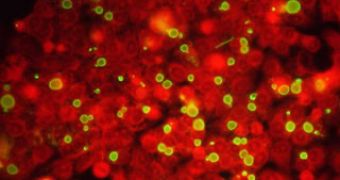HIV, syphilis or gonorrhea are words that go like bullets through your brain, but amongst all STDs, Chlamydia, the "Silent Epidemic" (named so because in women it may not induce any symptoms and will linger for months or years before being detected) is the most widely-spread. In men, Chlamydia can sometimes cause abnormal discharges from the penis and swelling of the testicles, but it is silent in most subjects.
Now, a team from Queensland University of Technology and Harvard will try using engineered mice to obtain a vaccine to protect teen girls against the infection with the most common sexually transmitted disease, Chlamydia trachomatis. Until recently, just women were thought to be possible subjects to Chlamydia-induced sterility. The bacteria harms the fallopian tubes, making them improper for allowing the egg's movement. But Chlamydia also induces severe DNA damage in sperm, translated into male sterility.
"Ultimately the idea is to understand enough about how Chlamydia interacts with cells and how the immune system responds to those infected cells, to be able to understand which components of the immune system need to be stimulated to fight the Chlamydia infection," said Dr Michael Starnbach from Harvard Medical School.
"When a person is infected with Chlamydia, the organism enters into the outermost cells of the genital tract and stays there and replicates within those cells. Once they're hidden within the cells, only the T-cells can recognize that the cells are infected and destroy those cells, ultimately eliminating the organism from the body."
The new mice are genetically engineered with T-cells specifically changed to defend against the mouse type of Chlamydia. "In doing this we will be able to learn things about what is involved in protecting mice against Chlamydia infection and then mimic those responses with vaccines," said Starnbach. "QUT has already identified certain proteins that may be able to be incorporated into vaccines to protect against Chlamydia infection," said Professor Peter Timms, from QUT's Institute of Health and Biomedical Innovation.
The rates of Chlamydia infection in some Australian communities can go up to 12 % of the female population, while 930,000 Americans are known to be infected, an underestimation, as most of the diseased people are not even aware of the infection and the real number could be as high as 2.8 million Americans (the second most spread STD, gonorrhea, infects "just" 360,000 Americans). In the US, about 2 % of the people under the age of 40 have Chlamydia.
"Chlamydia is the most common sexually transmitted disease in the world and results in infertility in women and long-term chronic pelvic pain. There are antibiotics to treat Chlamydia, but there's no vaccine to prevent it. In many cases women don't know they are infected because there are not really any physical signs or symptoms, so by and large they don't get treatment.", Tims said.

 14 DAY TRIAL //
14 DAY TRIAL //